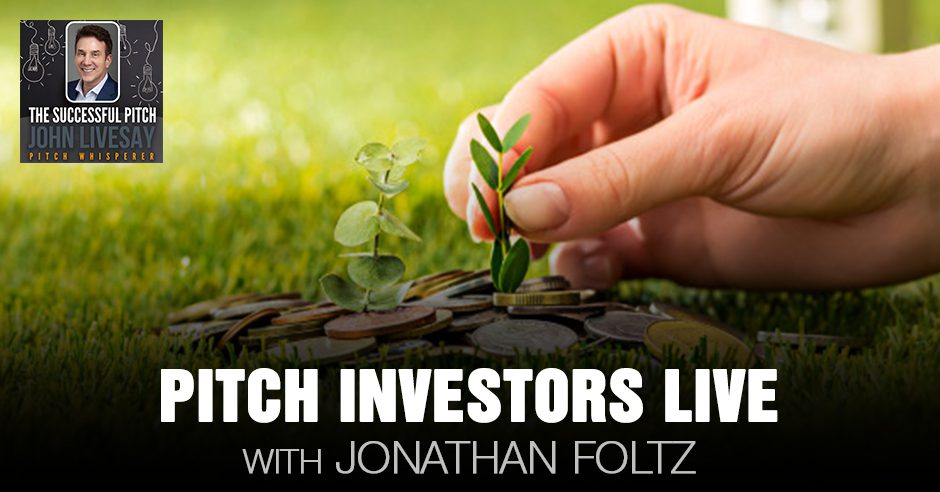Pitch Investors Live With Jonathan Foltz
Posted by John Livesay in podcast0 comments

Finding the right people to invest in your company, particularly start-up ones, is a pretty tedious and time-consuming endeavor to accomplish. But thanks to Pitch Investors Live, every business can take advantage of this online platform that’s very much like Shark Tank combined with Tinder. John Livesay interviews Pitch Investors Live Co-founder, Jonathan Foltz, to share how he and his friends started this groundbreaking project. He also looks back on his childhood and how his falling short of being a basketball player pushed him to pursue a career in entrepreneurship.
—
Listen to the podcast here
Pitch Investors Live With Jonathan Foltz
Jonathan Foltz is a Co-Founder of Pitch Investors Live. What they do is they help match up investors with founders looking for money, much like dating app meets Shark Tank. He talks about his career as an entrepreneur and how he had to overcome the fear of not being good enough after his dream of being a basketball star did not happen. That was his first pivot in life. He’s now gone on to do many other successful businesses and has life lessons of having a passion for what you do.
—
Our guest is Jonathan Foltz, who is the Co-Founder and visionary of Pitch Investors Live. He is a futurist, a philosopher and an avid knowledge seeker. He started multiple companies in technology, education, eCommerce and the digital space. He’s built $4 million brands in completely four different industries. He’s also the Owner of an international marketing agency, Digital Age Business, which has worked with some of the biggest brands in the world. He also owns multiple eCommerce brands. He was able to take a business to seven figures a month within its first year. Welcome to the show, Jonathan.
I’m happy to be here.
Before we dive into everything you’re doing and this whole concept of your own story of origin around the PitchInvestorsLive.com, I want to invite you to tell us your own story of origin. You can go back to childhood school. Where did you get this urge to be an entrepreneur? Did you always have a passion for multiple things? Start the story wherever you want.
Like many entrepreneurs, a lot of my entrepreneurial skills came from a necessity as a young kid growing up with my father and everything like that. He was in the oil industry and we traveled a lot. I was born in Canada, then we moved to New York, to Miami, to Argentina, to Columbia and then back to Miami. In between was Venezuela, Peru and the UK. I went to a few different schools when I was in Columbia as a kid. I got used to having to make new friends. That started to build a little of my social skills. As a kid, you want to be liked. I had to go and find brand new friends because I was moving from place to place. It was rough as a kid and you have to figure out the skillsets to make new kids, new teachers and new people in your realm like you. You’re like, “Now I’m in a brand-new environment.” It made me a little bit more confident having to go through so much of that. As time went on, my parents got divorced when I was 12, 13 years old.

Pitch Investors Live: A lot of our entrepreneurial skills came from a necessity.
I was obsessed with basketball. Basketball was my life. I thought I was going to be in the NBA. I had that belief system. I was obsessed. I watch ESPN and played all day. As time went on, I remember when my parents got divorced, I know that my mom had gone through a rough time during the divorce. She started hustling. She started working and doing some stuff with flea markets and stuff like that. The interesting thing about this is that my mom was a hustler. She was good, social, likable and had such a good personality that everyone loves her. She’s a social butterfly. That’s one of the skills that I got from her. That’s where I learned that type of skillset around that time.
Little by little, I started learning. I was able to get a computer. One of the things that I learned quickly when having a computer and a CD burner, which not a lot of my friends had them at the time, I was making CDs for friends. This was in the beginning stages. I was a little kid and people didn’t know about Napster. Every kid in the school was burning CDs. I happened to burn CDs for music stuff that they’d never heard of. I’ll put a cover on it and sell it. I’d made a little $5 here and there. One day, there was a CD coming out. It was called The Marshall Mathers LP, it’s an Eminem CD. Before it was coming out, I got access somehow to the internet as a little kid. This is when the internet was new. I was probably 14, 13 years old or something around the time. This was the early stages of when all this was coming out.
No one knew about Napster and how Napster would take down the entire entertainment business. It was crazy what was happening. We didn’t know what was going to happen from it. I knew that I’m like, “This is a popular CD.” I have early access to it. As a little kid, I have no idea what I’m doing here. I brought that CD to school and this was my first glimpse. I don’t know if they were giving fines for people at the time that were burning CDs and such. I don’t even think that time had come yet. Later down the road, people start getting fines. Their parents were getting $5,000 fines from the entertainment business. I don’t know if you remember that. They were sending out checks like lawsuits against a bunch of people, but little kids didn’t know. None of them knew what was going on. They’re little kids with power of the internet.
That’s what was exciting to me. Nowadays, people call me the Digital Frontiersman. I got my first sample of the power of the internet when you could do these things that were never possible before. When I got my hands on the internet as a little kid, my whole world had unfolded into something that I could never imagine. My first case study of great success. I tried all kinds of stuff. I try some baseball cards. I would open up all the cards and I would never be able to sell them all. That was a failed venture. I sold a little CDs here and there for $5. I was entrepreneurial because of my mom. When I did this The Marshall Mathers LP CD, I knew it was going to be a hit for some intuitive reason. I empty my book bag. I filled the entire book bag with these CDs. I went to school and sold them for $10 apiece. I sold every single one and my mind was blown. I was like, “What just happened?” The next day, every kid in school was selling them too. I saw what happened. It was like I was the first mover in that direction. Every kid in school went and copied the same model that I did and it blew up through the entire school, even so much so that the principals and everyone said, “You guys got to stop selling CDs in the hallways.”
[bctt tweet=”Our values and purpose are built out of voids.” username=”John_Livesay”]
That’s how big it became in our school, Palmetto High School, which is the same high school that Jeff Bezos went to. That was one of the things, but what put me into the entrepreneurial realm was in the 9th grade. I tried out for the basketball team and I got cut in the first round. For me, basketball was life. When I got cut from the basketball team and I knew that there were people on the team that made the cut that I was way better in, what it meant for me as a kid was I’m not good enough. I went home that night, went to my bed and I’m thinking to myself like, “If I’m not good at basketball, what am I good at?” Honestly, I have no clue what I’m good at. That was deteriorating to me. I had to go through a shift.
This is another reason I got into philosophy. Aristotle had something that he called upon Axiology. It’s a study that he developed and he called something the Telos, which was the purpose. All being the medium in mind and where you’re going in life. One of the biggest things that he talks about is that our values and purpose are built out of voids. Voids are things missing. What was missing to me was I’m not good enough. That started to build a mentality out of me that I wanted to be good enough. When I started to find out a little bit about the entrepreneurial realm, I started making money with these little side hustles selling whether it was sneakers, selling baseball cards or selling the CDs. Early out of high school, I had a pet shop. I started figuring out all these ways. I was like, “I’m good at something.” To me, it was inspiring because that wasn’t my mentality. I thought I wasn’t good at anything at that point when I got cut from the team. That was where the spark and the power came from. It was from me being cut from that team. It became one of my greatest driving forces.
What an inspirational story. That concept of not feeling good enough is something that people struggle with most of their life on a subconscious level sometimes. That’s why people fear rejection. That’s why we get into the imposter syndrome. We’re comparing ourselves to other people and coming up short, “I didn’t go to that Ivy League school. My book didn’t sell as much as theirs.” It’s an insane route. The fact that you were able to pivot at a young age like entrepreneurs learn to do and go, “Basketball is not it. I’ll figure something else out.” Even that earlier story you were telling about the people started copying you. That’s another big takeaway for everyone reading, which is investors are always going to ask you, “What’s your secret sauce?” “What’s your barrier to entry from a big competitor.” You had all that in that story. The awareness of, “Other people are going to think of this too, so I need to get something here that’s going to prevent other people from doing that.” Let’s talk about what void you saw in the marketplace that made you and your team start Pitch Investors Live?
I’ve started many companies. I’m going on maybe 25, 26 companies. I am one of those crazy serial entrepreneurs. I know well how hard it is first and foremost. Secondly, I started learning more about the investment space. I wanted to learn more. I remember reading many magazines and books. I’m like, “One day, I want to have my own venture capital fund. I want to be a venture capitalist. I want to work on multiple projects.” I’m much on the go. I’m a visionary, but I like to go and do it. I love the building process and that’s why I’ve done many different things.

Pitch Investors Live: You can have the greatest idea in the world, but if you don’t position it correctly, shift it, and adapt it, it’s not going to get anywhere.
My business partner was the founding founder, if you want to call him that, from the 2UP app itself. 2UP app was a debate app when it first started. That’s how Pitch Investors Live came in and that’s the time that I came in. 2UP itself was an app before Facebook Live existed. It was even before Periscope existed. Before all that stuff came out, 2UP came out. I had met Matt at a startup conference. He was launching 2UP. I was going to help him with marketing. We threw some ideas back and forth together. I was going to join him, but I was doing so many other things. I never joined 2UP. It got traction but it was missing some key components. Later down the road, when I and Matt came together to build Pitch Investors Live, we realized he’s the technical backend innovator and I’m the business dev marketing visionary. I know what can go to market the right way and how to position it. You can have the greatest idea in the world, but if you don’t position it correctly, shift it and adapt it, it’s not going to get anywhere.
Knowing all these different things and being a huge fan of Shark Tank, when Matt was developing Pitch Investors Live and it was like an older UI, I honestly did not like it at all. I was like, “This needs some major work.” He was trying to hire us to launch Pitch Investors Live. When we started talking about this, I invited them to a house that we were staying at called the Marketer’s Mansion. We rented a huge mansion on the top of a mountain in Arizona. It was five of us internet marketers, e-commerce experts. What we did is we created an accelerator. We had probably over 1,000 people come through those doors. We had a mastermind where there were two giant mansions and there was a jet involved where we went to Las Vegas. It was one of those fun things to do.
As time went on, we had different people come through the door. I remember Matt, he had a significant exit in the tech space. I’m like, “We need to get some high-end people here. We want to have some people that we can learn from and they can learn from us.” I called Matt, “We’re looking for another person. We have an open spot. One of our roommates has gone. What we do here is we collaborate. I’m looking to create some new apps. I know you know how to develop them. I know what’s going to make a whole bunch of money in the marketplace. That’s one of my expertise. Let’s get together and let’s build something.” When he came over, he started telling us about Pitch Investors Live and how he turned 2UP into pitch. He wants to take it to the next level. He wants branding.
There was also cryptocurrency and blockchain involved. To me, that was a massive space that is going to be monumental in the future. Every single big company now in the world is implementing some type of blockchain technology, especially in the financial space. Even the federal reserve and the Chinese are implementing full blockchain into their finance, but that’s a whole different story. That was exciting to me. I was getting the hang of it. I was like, “Let me see what he has available. I am busy but let me see what he wants.” I’m not trying to take clients on. We used to take clients because I had an agency. I stopped doing it and I listened. I was excited with what he had envisioned, but I knew there was more of what it could be and I knew what it took. I went back to him and I said, “I’m not going to take on this project. I’m not going to help you with the marketing. The only thing that I’ll do is I’ll come on as a co-founder to help you build this because this is bad-ass and I know what needs to get done.”
[bctt tweet=”It’s lovely to see people get success from a new technology that has come out that has changed how things used to be.” username=”John_Livesay”]
It needs some complete revamp on the branding side. The app needs to have all kinds of stuff. I was like, “I will come in. I’ll bring my entire team because this is an amazing idea.” It is amazing that I was like, “This has to come to market.” When I saw it, what I thought of and I gave it this interpretation, it was like you make Shark Tank together with Kickstarter, together with Tinder or Bumble, or one of the swipe dating apps together with live streaming technology. That right there is monumental. No one’s ever done that in the startup space or the funding landscape. No one’s done anything like that. We’re going to be the first people to be able to pull this off.
I was like, “That’s what I want to do. I want to come as a co-founder. I will not come in as anything else. You can’t hire me. He was happy. He was like, “Someone wants to join on board. All right, let’s do this.” We were friends also. That was one of the beneficial parts of the whole thing. As soon as I came on, I enrolled my business partner, Umer, into it. I enrolled my other roommates from the Marketer’s Mansion, Damien Coughlan, Lawrence Aponte, and there was this other guy, Odie, an amazing camera guy. We started enrolling all these people and everyone wants to join because it was a cool project. This is going to be monumental with what we could do not just with the blockchain components but also simultaneously, with the faction that what we want it to do is allowing people to invest in companies live. Imagine if you’re able to invest into companies as there’s a live pitch happening. This is a game-changer for me.
You also have Kevin Harrington on your advisory board. He’s also been a guest on this show. What I love about this story is that your dream and part of your pitch is to imagine Shark Tank meeting Kickstarter, meeting a dating app and live streaming. That is no longer like, “Wouldn’t it be nice to have that as an analogy?” One of the original Shark is part of this. The credibility factor goes soaring up. The first of many takeaways for people who are reading is who’s on your advisory board is as important as who’s on your team, especially if they’re active. When investors are looking at what kind of credibility and experience like, who you’re going to when you have questions and get stuck? Imagine all the years and all the deals that Kevin has heard so that he can say, “If I put myself in the shoes of an investor, this is what I’d want to hear and what’s missing from this pitch.”
You and I have discussed why I’m excited about joining with you and promoting this to people is investors I’ve interviewed on this show have told me, “We hear about 2,500 pitches in a year and funded about 25, 1%.” What you’re doing is allowing people to get in that 1% club. The old way of doing this is you had to get an introduction, you physically get in the room, you have ten minutes, and you hope you did a good enough job that you get invited back. I’ve seen that happen successfully multiple times in multiple levels from seed to series A, and all the other stuff that you’re talking about. Investors need to hear pitches. If you streamline this even before the pandemic and people weren’t traveling, think how much more productive it is. I’m only hearing pitches from people who are in Silicon Valley, for the most part. There’s got to be some other ideas out there. You’re allowing people to get heard without them having to move to Silicon Valley to build their network. It’s not that a network isn’t important, but I think this premise is so important. You have no shortage of investors that want to be part of this.

Pitch Investors Live: Every single big company now in the world is implementing some type of blockchain technology, especially in the financial space.
We have a good decent amount of all kinds of investors from VCs, Angels, regular credit investors and institutional.
One of the things I say when I’ve worked with people is don’t talk to an investor who only invests in AI if you’re not AI. You need to do a little homework on the investor’s portfolio and see if they have a competitor or they don’t fund the thing you’re pitching. You’re in the wrong room. You need to get in the right room with the right pitch, which is why this combination of what you’re doing is so smart. I’m guessing there’s some kind of vetting that’s going on so that an investor can see what’s coming up to see if he wants to watch those live pitches.
For anyone that wants to download Pitch Investors Live on both iOS, Android and PWA. We had a lot of people and some older investors that are like, “I want to be on my computer.” We’re like, “Let’s do PWA,” so we created that.
For those people who don’t know, what is PWA?
It’s a Progressive Web App, which means it’s like a website, except it loads much faster. You could use it on a website and you could get on it live like what you do on Zoom. That will be on a web browser. We added some very light artificial intelligence. It’s more like machine learning to allow people to connect. It’s already rolled out, but we’re going to roll it out and implement it in a cool manner. When the investor comes in, we’re going to find out all their information. What kind of projects they like? What’s the funding? What’s their sweet spot? How much money they’re looking to invest?
[bctt tweet=”If there’s something that’s truly inspiring to you, no matter what it is, go after that.” username=”John_Livesay”]
We’ve had some investors that are like, “Our sweet spot has been in the few hundred thousand dollars.” We have a lot of investors that are in the $2 million to $5 million range. They will put the ranges inside there. What kind of companies they’re looking for, if it’s pre-revenue or post-revenue? Some are willing to go into those companies that are early stage. Some are like, “No, I need to make sure that they’re making money.” We vet them in all that type of information. We then have the entrepreneurs answer similar questions. How the AI comes into place is it has a matchmaking service that pulls them like, “You guys are a good link because you’re looking for $2 million, he likes companies from $2 to $5 million. You’re an eCommerce, he likes to get eCommerce entrepreneurs.”
That was exactly the answer I was looking for on how we take the concept of a dating app and apply it to Shark Tank that it screened. The other thing that you are doing brilliantly is your pitch is saved in a library. Any potential investors can see it at any time. That alone is worth so much because if you’re a founder pitching and you figured, “This is my one shot.” If the right person is not there or they’re sick, I don’t get to come back because we’ve already passed on that. We’re looking at new pitches. This fear of, what if somebody doesn’t see it live? It completely goes away. For everyone reading who is trying to figure out how to get people to join their team, having good people, you got to be attractive to them. Once you’ve got that good team, you need to pitch the investors. You also need to pitch to get business clients, the marketing is part of that. There are three different buckets that the storytelling aspect that I teach helps solve that whole thing from start to finish.
The problem is a lot of people think, “If the right person doesn’t hear my pitch, then it’s lost forever.” Now you’ve solved that problem. The big takeaway here is think like Jonathan and his team. Anticipate an objection, whether it’s from an investor or a potential customer, which in this case it would be like, “If I’m going to pay money to put my pitch on live streaming, what if the perfect investor isn’t listening to me at that moment?” You’ve anticipated that problem and you have an answer and a solution for them that creates value. What I’m trying to do is use your model for people to not only say, “I need to get on Pitch Investors Live to get my startup funded,” but also for those people who are reading that aren’t necessarily looking for funding, they can still learn so much from you. They can learn from anticipating objections and answering them in advance, as opposed to being a deer in headlights when you get them from a customer or an investor.
One of the things that we’ve been very excited about is when you do come on to Pitch, you’re not pitching that one investor. It goes live in the app, on Facebook and YouTube. In the future, we plan on pushing that into other genres, stuff and potentially podcasts too. We have a story of a guy named Efren who had a company called Gemini Cyber Securities, it was something similar. He pitched Kevin. Kevin didn’t like the deal but he was like, “This is a good project. I might talk to Robert about it.” I don’t know the backstory on that, but what I do know is that it was saved on YouTube. Efren put on his own LinkedIn. Someone hit him up on LinkedIn because of the video that was online. They didn’t watch it live. They’ve watched a rerun of it. They contacted him. He got fully invested, found two new partners from that live that was prerecorded on the internet. Several months later, we come to find that Efren got acquired. He got the Pitch helped him find his investor, gets two partners and then get acquired several months later. None of that would have been possible or at least in that timeline if he had it on his homepage and then had it on there. It’s lovely to see people get success from a new technology that has come out that has changed things how they used to be.

Pitch Investors Live: Imagine if you’re able to invest in companies as there’s a live pitch happening. It’s a game-changer.
It’s a philosophical perspective on life. It goes back to a metaphysical way we’re talking about in your childhood, which is either you feel like you’re good enough or you don’t. You have to compare yourself to other people or you don’t. Einstein said, “One of the biggest decisions we ever make is if we feel that the world is a safe and friendly place or it’s not.” From that one decision, we then go looking for evidence to support that decision. The same thing is true in the startup world or entrepreneurship. You either believe that you’re going to get good people. It doesn’t mean you don’t do your due diligence, but it’s your mindset. If you have the belief that, “I never know who’s going to be listening to this live pitch on what platform, that could change my life.” If I believe and I’m open to those possibilities as opposed to, “I must know how it’s going to happen, when it’s going to happen, and who’s listening.”
The structure is great but you might want to be an accountant versus an entrepreneur if that’s the way you’d like to think and work. That’s why I love that story you share because the goal is we want other people to see themselves in that story of someone who used your platform and say, “If that happened for that founder, it could happen for me.” That’s what you are creating. You’re walking your talk on many levels. I don’t even know if you realized it. You’re inspiring people with your own passion and your own unlimited thinking of possibilities while also helping other people and making money. That’s the dream.
The social impact aspect of it is the factor that is going to continue to get more and more important. People feel that energetically when they talk to you, when they tuned-in to this show, and when they go to your website. All of that is what I want to leave everybody with. Your brand and your messaging need to be consistent. It is constantly sending out some kind of vibration and energy. It’s up to you to define what your culture is, and define who fits and who doesn’t. When that happens, then you trust and allow the rest to fall into place. You have a good story. You’re in the right room. You’re embracing new technologies and new ways of doing things so you’re not dependent on who your network is at any given time. That’s what I see is your big impact on the world.
I do this because I love it. That’s why even starting Pitch was something that I believed in and I knew how much entrepreneurs needed the support. In the funding landscape, you hit it on the nail how we explained it to people in the beginning stages. We don’t want the entrepreneurs to have to go to Silicon Valley or have to go to New York. The best thing for them is why can’t they be at home and be able to pitch an investor instantaneously from anywhere that they’re at.

Pitch Investors Live: Entrepreneurs don’t have to go to Silicon Valley or New York. They can be at home and be able to pitch to an investor instantaneously from anywhere they’re at.
With the pandemic, your timing is perfect. You’ve been doing this for years. We’ve got it all the kinks ironed up. You’ve got proof of concept. The timing in the synergy of now more than ever, no one’s going and pitching people in person. Any last thoughts or inspirational quotes that you want to leave us with?
One of my beliefs in life is that you have to do something that is truly inspiring to you. If you’re doing things for the money, you’re doing things because of the judgment that you had, what your parents thought or whatever it is, the biggest thing that has been proven even scientifically, to give you more energy and longer life span is being inspired about something. If there’s something that’s truly inspiring to you no matter what it is, if you go after that, it changes the dynamic. You go to sleep with energy. You wake up with energy. Your true genius and potential come out in forms that you can’t even imagine. Any time that you can tap into that flow, that is where your true potential comes from and where you’ll make a great impact in the world. Usually, it’s of service like what you’re doing right here on this show.
I can support what you said because I was hired as a speaker once. My agent said to me, “It was between you and another speaker, they loved your energy and they want to hire you.” We can never underestimate how much passion and our energy is what people are buying. We’ve heard this line a hundred times, “Investors invest in the jockey, not the horse.” The person is the jockey. Jonathan, thanks for your passion, energy, insights, and for creating Pitch Investors Live as a place for both investors and founders to find each other like a dating app while still having a little technology to make sure those matches are good. We all need innovation now more than ever to solve all these big problems we have. You’re the catalyst in making that happen.
I appreciate that. It was great coming on here and being able to speak to you and everyone.
Important Links
- Digital Age Business
- https://PitchInvestorsLive.com/
- Kevin Harrington – Past episode
- Better Selling Through Storytelling Method Online Course
Wanna Host Your Own Podcast?
Click here to see how my friends at Podetize can help
Purchase John’s new book
John Livesay, The Pitch Whisperer
Share The Show
Did you enjoy the show? I’d love it if you subscribed today and left us a 5-star review!
- Click this link
- Click on the ‘Subscribe’ button below the artwork
- Go to the ‘Ratings and Reviews’ section
- Click on ‘Write a Review’
Love the show? Subscribe, rate, review, and share!
Join The Successful Pitch community today:
- JohnLivesay.com
- John Livesay Facebook
- John Livesay Twitter
- John Livesay LinkedIn
- John Livesay YouTube
Tags: branding, entrepreneurial skills, live pitching, live streaming technology, Marketing, social media
